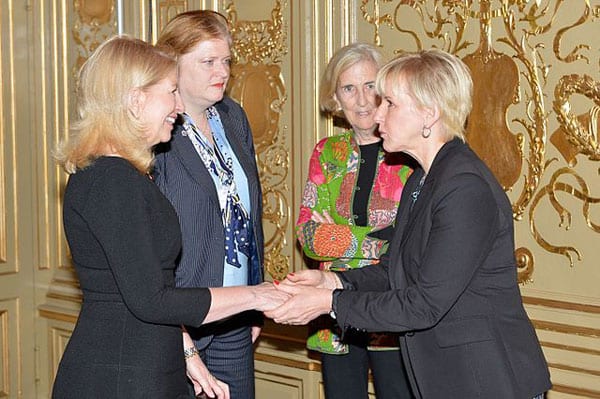
March 4, 2019; Philanthropy Women
An article in Philanthropy Women points north to Sweden as inspiration for the growth of “feminist foreign policy” and a philanthropic sector to support it—but writer Laura Dorwart fails to account for the women and organizations outside of the Western world that are setting the pace for creating equality in policy and practice.
Dorwart explains that Sweden’s leader Stefan Löfven championed an explicitly feminist foreign policy after his 2014 election, and his recent reelection could mean more progress toward those goals:
In Sweden’s case, the policy focused on funding initiatives across the three “Rs” in which women tend to be underserved and neglected: resources, representation, and rights. Donors who are interested in promoting gender equality through their efforts and outreach can look to the Swedish model of feminist foreign policy to know where to begin.
Since implementing the groundbreaking foreign policy, the Swedish government has funded initiatives across the world in sexual and reproductive rights (from licensed midwifery programs to maternity care, contraceptives, sex education, and safer abortions), fighting gender-based violence, and promoting education and economic empowerment for women and girls.
Examples of successful projects that Sweden has funded thus far include programs to prevent unwanted pregnancies and unsafe abortions in East Africa, a study on domestic violence prevention in China, and increased representation of women—as peace mediators around the world, in the Moldovan and Somali parliaments, and even on Wikipedia. The Swedish government was also instrumental in founding the She Decides movement, a global initiative on safe family planning that funds a range of services, from affordable and safe abortions to accessible birth control and medical care.
Philanthropy Women also points to other Western countries as models for rethinking foreign policy and development, including Canada and the UK, and notes that these countries aim to empower women from the ground-up by partnering with local NGOs.
But, the acclaim may be premature when these kind of partnerships could put local NGOs at risk—in countries with authoritarian leaders, frequent crackdowns on foreign-funded organizations supporting human rights are used to consolidate power. Even India has followed the playbook.
Sign up for our free newsletters
Subscribe to NPQ's newsletters to have our top stories delivered directly to your inbox.
By signing up, you agree to our privacy policy and terms of use, and to receive messages from NPQ and our partners.
Foreign Policy magazine also recently praised Sweden for being the first country in the world to publicly adopt a feminist foreign policy and called for the world to follow. However, Rwanda, Cuba, Bolivia, and Mexico all rank higher than Sweden when it comes to female representation in national parliaments (the US is further down the list in 79th place)—even if these countries might not explicitly label policies as “feminist.” And, the idea of simply sandwiching foreign policy and feminism together is problematic when each has its own separate challenges, especially in the US.
Foreign policy is, by its nature, a top-down, governmental approach to global issues that is largely shaped and influenced by men. Foreign Policy Interrupted, a group that aims to disrupt the status quo by cultivating female foreign policy experts, notes that in the US, only 24 percent of foreign affairs and national security guests booked on cable programming were women in 2016, according to a Media Matters study.
The US has had several women serve as Secretary of State—Hillary Clinton undertook a sweeping plan to make women’s rights the focus of American foreign policy—but the State Department’s already-low level of diversity has taken a hit under President Donald Trump over the last few years.
Further, the development and aid arm of US foreign policy has a long and troubled history of corruption and harm to human rights—not to mention the many issues the US feminist movement has failed to address, from racism to classism. How can we advance foreign policy and feminism without perpetuating the inequality that built it?
Indeed, Foreign Policy points out that Sweden’s “feminist foreign policy” has already faced criticism from groups like the Centre for Feminist Foreign Policy, based in Europe, which advocates for an intersectional foreign policy that puts people at the center of policy.
In an analysis called “Hiding Behind the F-Word,” the Centre highlights the tug-of-war between Sweden’s “soft power” ideals and resistance by the military and business leaders to stop weapons sales to countries that violate human rights.
“Effectively, Sweden is still not so different from other so-called liberal states who pursue state-centric ‘feminist’ foreign policies upheld by militarism,” the Centre’s Annina Claesson wrote.
Even looking beyond the label of feminism, perhaps the primary tenet of foreign policy and development created by wealthier countries to “help” the world should be copied from a different sector altogether: first, do no harm.—Anna Berry











